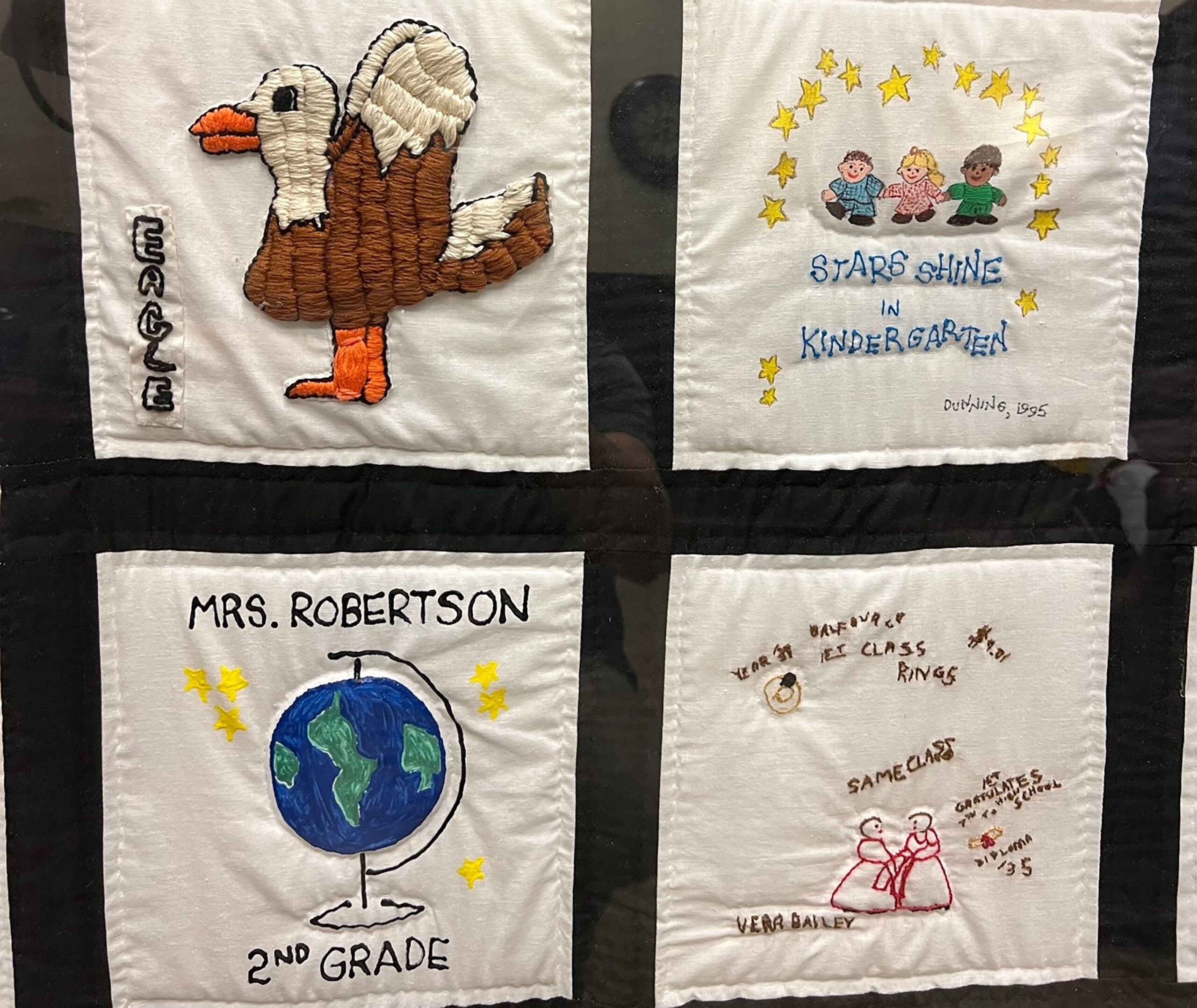Quilting has a long history. For early settlers in Gwinnett County, quilts were essential for keeping warm during winter months. Quilts were used to provide a warm cover while in bed, but they were also used to keep cold drafts from coming into a home or room through doors and windows.
These early settlers were primarily farmers and not wealthy, nor did they have access to fabric and materials in remote communities like Sugar Hill. They would often make quilts from discarded materials or even older quilts. Over time, these quilts would become a patchwork of material.
As time went on and fabric became less expensive and more available, quilt making improved in quality. The patchwork of squares and material also became more artistic and sentimental. It was not uncommon for quilts to be passed down from generation to generation and to include heirloom type remembrances in the squares, such as pieces of a wedding dress or even stitching that honored key moments or individuals of the past. Quilting is not as common in modern times, but there is still a tradition of passing quilts down to future generations.
The Sugar Hill Historic Preservation Society is the caretaker of quilts that have been donated to the community for future generations to remember key moments in our past. One quilt, donated in 2022 by Sugar Hill Elementary School, is on display in the mayor’s office at City Hall. It is one of two quilts that was completed in 1995 for Sugar Hill Elementary School. Although large in size, the quilt at City Hall is the smallest of the two quilts. The year 1995 was significant because it represented the 80th anniversary of the school. In 1995, the school also moved to its then new and current location on Level Creek Road. The quilts were made to commemorate the history of the school and the significance of a new facility for a growing community that had evolved from rural beginnings when the first Sugar Hill School was opened in 1915.
The quilt at City Hall has 15 squares. One of the squares recognizes all the members of the Sugar Hill High School Class of 1942. There were 13 members of the graduating class of 1942, including Glad Sudderth. He received a scholarship to study agriculture in college, but he joined the military instead and fought during World War II and was in Japan when the war ended. Perry Youngblood, part of the same class, would also go on to fight in the war. Other men in Glad’s and Perry’s class served their country during World War II as well. In 1995, Perry and Glad were both still alive and in their 70s and, no doubt, excited by the new Sugar Hill Elementary School.
Another square on the quilt at City Hall contains the image of an eagle. The eagle was designated as the mascot of the school until it was changed to a longhorn when Sugar Hill Elementary School became part of the Lainer cluster. While no longer the symbol of the school, the tradition of the eagle carries on through the city’s mascot, Eddy the Eagle, and the Eagle Theatre. Two squares on the quilt were given to the school by Vera Mae Bailey. She was a 1939 graduate of Sugar Hill High School. Other squares recognize teachers like Mrs. Robertson, who taught second grade, the “Care Team” and even the school cafeteria staff. Mrs. Shaw’s “Lunch Bunch” are stitched into the square and named as Ms. Clark, Ms. Britt, Ms. Lord, Ms. Jackson and Ms. Caddais.
Our stories as a community are told in many ways. Sometimes our past is told through written history like articles in a newspaper or paragraphs in a history book. At other times, our stories might be told in place names or street names like the Eagle Theatre, Nelson Brogdon Boulevard or Gold Mine Drive. Like a patchwork though, our history and stories as a community can be sewn together and told through artwork in a quilt.
Brandon Hembree is mayor of Sugar Hill. He is a 20-year resident of the city, and he uses his interest in history to detail Sugar Hill’s rich past.
FEATURED PHOTO: The Sugar Hill Historic Preservation Society is the caretaker of a quilt donated in 2022 by Sugar Hill Elementary School. The quilt is on display in the mayor’s office inside Sugar Hill City Hall. The squares on the quilt commemorate the history of the school. Photo courtesy of Brandon Hembree.




